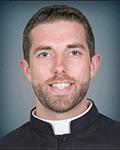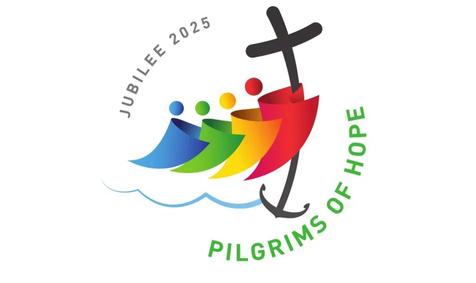
6 minute read
A Year of Jubilee; A Pilgrimage of Hope
A Year of Jubilee; A Pilgrimage of Hope
In the darkness of Nazi occupied Krakow, Poland, on the cold winter day of February 18, 1941, a twenty-one-year-old Polish man returned from a long day of work in the rock quarries outside the city. Before returning home, the young man went to a local family’s house to pick up dinner and medicine for his father. When he arrived home, he proceeded to his father’s room down at the end of a long dark hallway. On the bed was the lifeless body of his father. His heart was already broken by the death of his Mother in his childhood, by the death of his only brother the year prior, and by the Nazi destruction of the Polish people. Now, the young man ’ s heart was crushed as he knelt down by his father’s bed and wept inconsolably… He would later say of this moment, “I never felt so alone.”
This is an early-life snapshot of the man who would later describe himself as a “Witness to Hope,” a man named Karol Wojiwa, who to history is known as Pope St. John Paul II.
Every twenty five years, the Catholic Church celebrates a “ year of Jubilee” in which we refocus on “the basics” of the Christian Message: the good news, that God is Emmanuel (“God with us”), that Jesus Christ is our Savior, that we have received forgiveness for our sins, transformation into His sons and daughters, and the hope of eternal life. For us as Catholics, 2025 is a jubilee year in which we remember these mercies and are invited to respond with personal conversion and joyful celebration.
“I never felt so alone.”
~ Pope St John Paul II
As we begin this Jubilee Year as a Church with the theme, “Pilgrims of Hope,” I have been personally reflecting on the life of this “Witness to Hope,” St. John Paul II. Certainly, this great saintly leader of the 20th century needs no introduction! In 1995, Pope John Paul II spoke to the United Nations saying, “Men and women must learn to conquer fear. We must learn not to be afraid, we must rediscover a spirit of hope and a spirit of trust.” However, it begs the question, with young Karol leading such a tragic early life, how did this man respond with such hope -- not only with a private, personal hope, but also by encouraging the entire world to “rediscover a spirit of hope?” continued
Father Jonathan Fioramonti
To grasp the nature of our Christian hope, we must return to its origin. In the baptism of an infant, the priest will have a dialog with the parents: After asking the parents the name of their child, the priest will ask the parents: “What do you ask of the Church?” the parents answer: “Faith.” The priest again asks “And what does faith give you?” to which the parents respond: “Eternal life.” At the last supper, in the seventeenth chapter of John’s Gospel, we hear Jesus say: “Now this is eternal life, that they should know you, the only true God, and the one whom you sent, Jesus Christ.” Now we begin to understand the seed of baptismal hope found and nourished in the tragic life of a young Karol Wojiwa. He knew eternal life as a Person, as His savior, as His God, and as Jesus Christ in whom he learned to place his trust, his Hope. According to the Catechism of the Catholic Church, Christian hope is “the theological virtue by which we desire the kingdom of heaven and eternal life as our happiness, placing our trust in Christ’s promises and relying not on our own strength, but on the help of the grace of the Holy Spirit” (CCC 1817).
The Church, as our Mother, has in her wisdom given us this year of Jubilee to remind us that each of us are “pilgrims of Hope.” She reminds us that hope is like a seed to be nourished and a sail to be unfurled as we personally live out the entirety of the Christ message in Christ’s Church, setting our sites on eternal life, the Person of Jesus Christ. She encourages us to desire his Kingdom, to trust in His promises, and to rely not on our strength, but His.
How many in our world, indeed in our own parishes, and our beloved PVI school community, live lives of quiet desperation? How many of us have little corners of our soul in which we find a part of ourselves weary, lonely, trapped in unforgiveness, resentment, and bitterness, oppressed by personal failure, despairing of the past, fearful of the future, perhaps denying our deepest needs, or simply feeling broken in heart and spirit?
How many in our world, indeed in our own parishes, and our beloved PVI School community, live lives of quiet desperation?

In St. Paul’s letter to the Romans, we hear him give this encouragement:
We even boast of our afflictions, knowing that affliction produces endurance, and endurance, proven character, nd proven character, hope, and hope does not disappoint, because the love of God has been poured out into our hearts through the Holy Spirit,” Romans 5:5.
Tragic-stricken young Karol Wojiwa discovered in his deep sorrow and pain this “hope that does not disappoint.” As we begin this year of Jubilee, I invite each of us to ask ourselves: Do I desire God’s Kingdom above all else? Do I know and trust God’s Promises found in sacred scripture? Do I rely on my own strength or the strength of Jesus Christ? In reflecting on these questions and exercising our Christian life, we come to know eternal life, Jesus Christ, and become even in the midst of our own affliction, “Witnesses to Hope,” like St. John Paul II.
I encourage you to listen to Bishop Burbidge’s homily as he opened this year of Jubilee in the Arlington Diocese, and to pilgrimage to the holy sites in the Arlington Diocese and the universal church to receive the special Jubilee indulgences.
Please know of my prayers. May God bless you and keep you as Witnesses to Hope.
Do I rely on my own strength or the strength of Jesus Christ?










